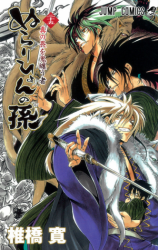At the start of the manga, Rikuo's hesitation as a character about what path he wishes to walk mirrored the author's own indecision about how he wanted the story to feel (e.g. balance betwen serious and comic) and what direction he wanted to take various members of the large cast of characters in. There seemed to be a wide variety of bishounen, with few female characters and lots of male comradery, so this manga deserves comparison to Hitman Reborn. I kept reading because there were many good points from the beginning: 1) the characters are all really likable, especially fan favorite Tsurara, with some good "secret identity" character intrigue, 2) the art is beautiful and has only gotten better, and 3) the author really does his research on youkai while putting interesting spins on old ideas. I guess you could say the plot was the weak point, because it progressed only very gradually in an interesting direction.
The manga got better. At some point into the Kyoto arc (the 2nd/3rd major arc, a really long one that composes the entire 2nd season of the anime) NuraMago settled with a mix of a heavy amount of dramatic action, a lot of plot intrigue, and some enjoyable side comedy that doesn't trivialize the plot. Rikuo takes up the mantle of protecting his friends and his family, fighting beside his honorable youkai comrades against aggressive and evil youkai with unpredictable powers. In other words, NuraMago is now a story about Rikuo's battles and those who play important roles in them such as fighting or being in need of protection.
As a change of pace from other WSJ fighter manga, the plot and the action are constantly in motion, with little focus on pride or on 1-on-1 matches. Major points for having the Yuki-Onna youkai Tsurara, be a girl who's constantly fighting, and yet we don't ever hear that "I can't fight girls" line. The main antagonist of the Kyoto arc is also a girl, and she makes quite an impressive villain.
NuraMago is lacking a few things. First is that the characterization is sometimes a bit direct, as the plot intrigue spins things out faster than characters can react interestingly. Second is that while the way that youkai powers work in battle is really clever, it's hard to follow and very hard to measure power levels (compare it to Negima with its billion spell names). Reborn does a way better job with power levels. Third is that the author has, for now, chosen to develop the relationships between characters gradually or indirectly; it's a million times better than little or no development like in Bleach or One Piece, but I still really wish he'd look to Yuyu Hakusho for inspiration there.
As of chapter 180 we're in the middle of the arc after the Kyoto arc, and it feels quite fresh and exciting. The author definitely has a talent for designing great villains.





